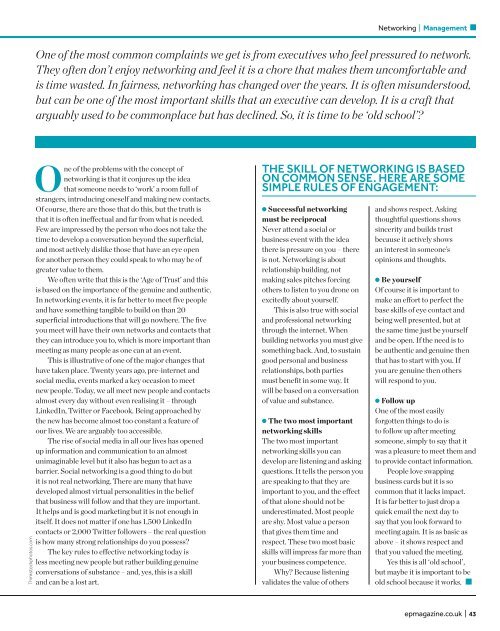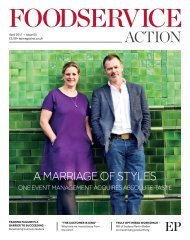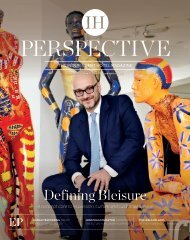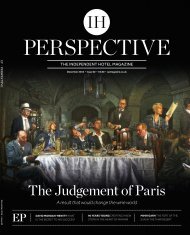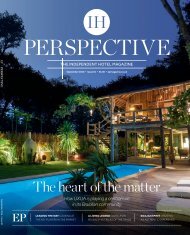EP Business in Hospitality Issue 53 - April 2015
EP magazine provides a reference point for executives on topical issues which may impact business growth, industry structure, professional and skill development, and broader economic and political changes. The magazine reports on all sectors of the industry, including hotels, restaurants, events and foodservice (contract catering).
EP magazine provides a reference point for executives on topical issues which may impact business growth, industry structure, professional and skill development, and broader economic and political changes. The magazine reports on all sectors of the industry, including hotels, restaurants, events and foodservice (contract catering).
Create successful ePaper yourself
Turn your PDF publications into a flip-book with our unique Google optimized e-Paper software.
Network<strong>in</strong>g | Management<br />
One of the most common compla<strong>in</strong>ts we get is from executives who feel pressured to network.<br />
They often don’t enjoy network<strong>in</strong>g and feel it is a chore that makes them uncomfortable and<br />
is time wasted. In fairness, network<strong>in</strong>g has changed over the years. It is often misunderstood,<br />
but can be one of the most important skills that an executive can develop. It is a craft that<br />
arguably used to be commonplace but has decl<strong>in</strong>ed. So, it is time to be ‘old school’?<br />
Th<strong>in</strong>kstockphotos.com<br />
One of the problems with the concept of<br />
network<strong>in</strong>g is that it conjures up the idea<br />
that someone needs to ‘work’ a room full of<br />
strangers, <strong>in</strong>troduc<strong>in</strong>g oneself and mak<strong>in</strong>g new contacts.<br />
Of course, there are those that do this, but the truth is<br />
that it is often <strong>in</strong>effectual and far from what is needed.<br />
Few are impressed by the person who does not take the<br />
time to develop a conversation beyond the superficial,<br />
and most actively dislike those that have an eye open<br />
for another person they could speak to who may be of<br />
greater value to them.<br />
We often write that this is the ‘Age of Trust’ and this<br />
is based on the importance of the genu<strong>in</strong>e and authentic.<br />
In network<strong>in</strong>g events, it is far better to meet five people<br />
and have someth<strong>in</strong>g tangible to build on than 20<br />
superficial <strong>in</strong>troductions that will go nowhere. The five<br />
you meet will have their own networks and contacts that<br />
they can <strong>in</strong>troduce you to, which is more important than<br />
meet<strong>in</strong>g as many people as one can at an event.<br />
This is illustrative of one of the major changes that<br />
have taken place. Twenty years ago, pre-<strong>in</strong>ternet and<br />
social media, events marked a key occasion to meet<br />
new people. Today, we all meet new people and contacts<br />
almost every day without even realis<strong>in</strong>g it – through<br />
L<strong>in</strong>kedIn, Twitter or Facebook. Be<strong>in</strong>g approached by<br />
the new has become almost too constant a feature of<br />
our lives. We are arguably too accessible.<br />
The rise of social media <strong>in</strong> all our lives has opened<br />
up <strong>in</strong>formation and communication to an almost<br />
unimag<strong>in</strong>able level but it also has begun to act as a<br />
barrier. Social network<strong>in</strong>g is a good th<strong>in</strong>g to do but<br />
it is not real network<strong>in</strong>g. There are many that have<br />
developed almost virtual personalities <strong>in</strong> the belief<br />
that bus<strong>in</strong>ess will follow and that they are important.<br />
It helps and is good market<strong>in</strong>g but it is not enough <strong>in</strong><br />
itself. It does not matter if one has 1,500 L<strong>in</strong>kedIn<br />
contacts or 2,000 Twitter followers – the real question<br />
is how many strong relationships do you possess?<br />
The key rules to effective network<strong>in</strong>g today is<br />
less meet<strong>in</strong>g new people but rather build<strong>in</strong>g genu<strong>in</strong>e<br />
conversations of substance – and, yes, this is a skill<br />
and can be a lost art.<br />
THE SKILL OF NETWORKING IS BASED<br />
ON COMMON SENSE. HERE ARE SOME<br />
SIMPLE RULES OF ENGAGEMENT:<br />
Successful network<strong>in</strong>g<br />
must be reciprocal<br />
Never attend a social or<br />
bus<strong>in</strong>ess event with the idea<br />
there is pressure on you – there<br />
is not. Network<strong>in</strong>g is about<br />
relationship build<strong>in</strong>g, not<br />
mak<strong>in</strong>g sales pitches forc<strong>in</strong>g<br />
others to listen to you drone on<br />
excitedly about yourself.<br />
This is also true with social<br />
and professional network<strong>in</strong>g<br />
through the <strong>in</strong>ternet. When<br />
build<strong>in</strong>g networks you must give<br />
someth<strong>in</strong>g back. And, to susta<strong>in</strong><br />
good personal and bus<strong>in</strong>ess<br />
relationships, both parties<br />
must benefit <strong>in</strong> some way. It<br />
will be based on a conversation<br />
of value and substance.<br />
The two most important<br />
network<strong>in</strong>g skills<br />
The two most important<br />
network<strong>in</strong>g skills you can<br />
develop are listen<strong>in</strong>g and ask<strong>in</strong>g<br />
questions. It tells the person you<br />
are speak<strong>in</strong>g to that they are<br />
important to you, and the effect<br />
of that alone should not be<br />
underestimated. Most people<br />
are shy. Most value a person<br />
that gives them time and<br />
respect. These two most basic<br />
skills will impress far more than<br />
your bus<strong>in</strong>ess competence.<br />
Why? Because listen<strong>in</strong>g<br />
validates the value of others<br />
and shows respect. Ask<strong>in</strong>g<br />
thoughtful questions shows<br />
s<strong>in</strong>cerity and builds trust<br />
because it actively shows<br />
an <strong>in</strong>terest <strong>in</strong> someone’s<br />
op<strong>in</strong>ions and thoughts.<br />
Be yourself<br />
Of course it is important to<br />
make an effort to perfect the<br />
base skills of eye contact and<br />
be<strong>in</strong>g well presented, but at<br />
the same time just be yourself<br />
and be open. If the need is to<br />
be authentic and genu<strong>in</strong>e then<br />
that has to start with you. If<br />
you are genu<strong>in</strong>e then others<br />
will respond to you.<br />
Follow up<br />
One of the most easily<br />
forgotten th<strong>in</strong>gs to do is<br />
to follow up after meet<strong>in</strong>g<br />
someone, simply to say that it<br />
was a pleasure to meet them and<br />
to provide contact <strong>in</strong>formation.<br />
People love swapp<strong>in</strong>g<br />
bus<strong>in</strong>ess cards but it is so<br />
common that it lacks impact.<br />
It is far better to just drop a<br />
quick email the next day to<br />
say that you look forward to<br />
meet<strong>in</strong>g aga<strong>in</strong>. It is as basic as<br />
above – it shows respect and<br />
that you valued the meet<strong>in</strong>g.<br />
Yes this is all ‘old school’,<br />
but maybe it is important to be<br />
old school because it works.<br />
epmagaz<strong>in</strong>e.co.uk | 43


